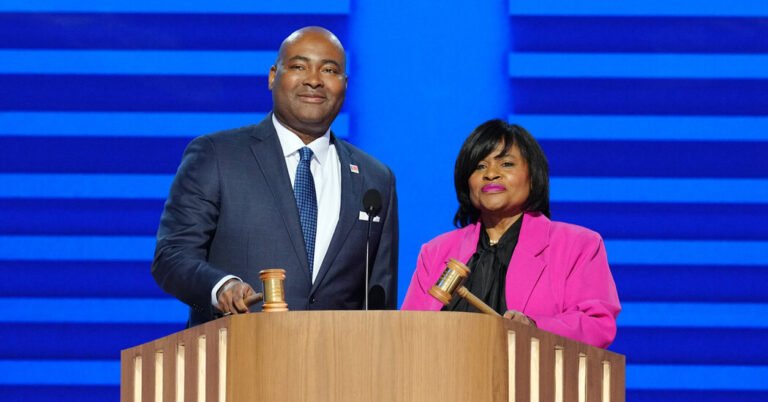
When Vice President Kamala Harris takes the convention stage to formally accept the Democratic nomination on Thursday, it will mark the culmination of decades of public and behind-the-scenes work to make the party more reflective of its multiracial base.
Off the convention stage, the moment is particularly meaningful for a group of Black women in Democratic politics who have long championed Ms. Harris’s political rise. And in a serendipitous intertwining of events, one of them is running the whole show.
Those who know Minyon Moore, the veteran Democratic strategist and chair of this year’s Democratic National Convention, say she is accustomed to operating behind the scenes. She helped lobby President Biden to select Ms. Harris to be his running mate in 2020. She later left a job in the private sector to help coordinate the effort to support Ketanji Brown Jackson’s Supreme Court nomination.
“You could probably take a bag of rocks and throw it in the air at the D.N.C. convention and they’re going to fall on somebody who’s going to tell you a story about the time that Minyon Moore quietly helped them, quietly pushed them, quietly accelerated them to a place where they now are now yielding influence in a very powerful way,” Jotaka Eaddy, a veteran Democratic organizer, said.
Ms. Moore’s role overseeing the convention has required her to depart from the private meetings and side phone calls that have been features of her professional career. It may also test the coalition-building skills she has spent nearly four decades honing. Thousands of demonstrators are expected in Chicago this week to protest the convention and Democrats’ handling of the humanitarian crisis in Gaza caused by the war between Israel and Hamas.
Some of those tensions are on display within the event itself. A group of delegates representing the Uncommitted movement, which has protested the Biden administration’s Israel policy, have joined some of the demonstrations and are hosting separate programming.
The specter of robust protests has led some to draw parallels between this year’s convention and the 1968 Democratic convention in Chicago, which brought chaotic protests and an aggressive police response. In an interview, Ms. Moore said the comparisons were off the mark.
“The world has changed. This city has changed,” Ms. Moore said. “And if we are still situating ourselves back in that history, then that’s saying that we are running in place and we have not changed as Americans. And I firmly reject that.”
President Biden’s decision in July to abandon his re-election bid also forced Ms. Moore and her staff to scramble. As the convention approached, there were three key party figures to consider — Mr. Biden, Ms. Harris and her running mate, Gov. Tim Walz of Minnesota. That has meant spending the last month adjusting the week’s programming while trying to accommodate the explosion of supporters now clamoring for a chance to take part in the excitement of the week.
And things didn’t go off without a hitch: Mr. Biden was scheduled to speak around 11 p.m. Eastern time Monday, a capstone of his political legacy and the big finale to the night. But after speeches ran long, he didn’t begin until well past prime time on the East Coast.
Ms. Moore’s appearance during Monday’s programming marked one of the most public-facing moments of her career, though her time on the convention stage was largely devoted to procedural matters. In an interview, Ms. Moore said the nature of her role has been something of an adjustment.
“For me, so much of my life is spent behind the scenes, which I love and revel. This position certainly has forced me to come from behind the scenes,” she said.
Ms. Moore got her start in politics through Jesse Jackson’s 1988 presidential campaign, headquartered in Chicago, her hometown and an epicenter of Black political power. Democrats paid tribute to Mr. Jackson on Monday in a moment complete with an appearance by the former candidate onstage.
Ms. Moore has served as chief executive of the Democratic National Committee and before that was the White House director of political affairs and director of public liaison under President Bill Clinton, making her the first Black woman to hold the posts. In 2008 and 2016, she was a senior adviser to Hillary Clinton’s presidential campaign, and she supported Ms. Harris in her first presidential bid in 2020.
Her friends, a group of long-serving, powerful Black woman political strategists known as “the colored girls,” have rallied around her.
Leah Daughtry, the co-chair of the convention’s rules committee who co-wrote the political book “For Colored Girls Who Have Considered Politics” with Ms. Moore, Donna Brazile and Yolanda Caraway, said she has offered some practical advice to Ms. Moore, who they affectionately call “Minnie”: Wear comfortable shoes. Avoid striped clothes that won’t show up well on television. Arrive in the convention center early enough to take the temperature of the room — and the people in it.
“We didn’t do any of this because we thought we were trying to get recognition. We wanted to swing the door wider,” said Ms. Daughtry, who was chief executive of the Democratic convention in 2016. “We wanted everyone to have an opportunity. And so we did the work that we did. It’s led to this moment.”
Ms. Moore said she would take stock after the work was done.
“My biggest goal for this convention is to make sure people feel energized and to feel like they have the necessary tools that they need to really go out and work,” she said. “I’ll revel in the moment of history, maybe Friday.”